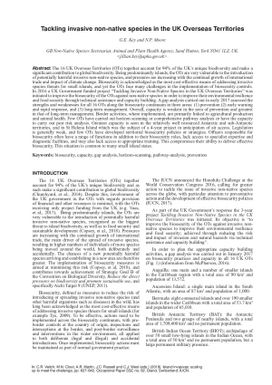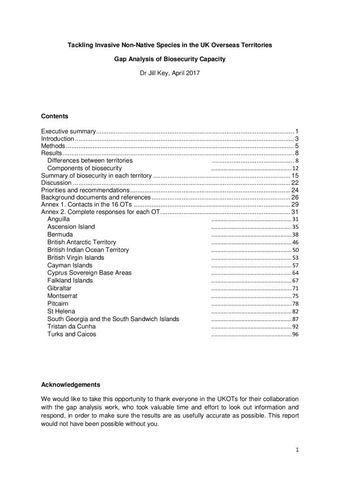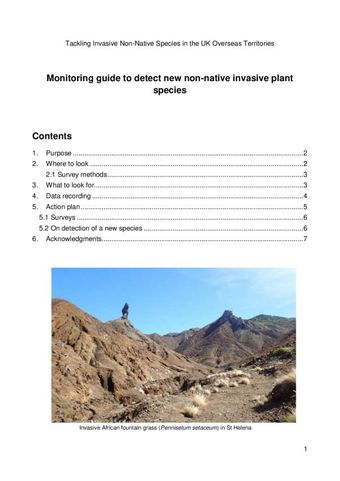Tackling invasive non-native species in the UK Overseas Territories
- Description:
- The 16 UK Overseas Territories (OTs) together account for 94% of the UKs unique biodiversity and make a significant contribution to global biodiversity. Being predominantly islands, the OTs are very vulnerable to the introduction of potentially harmful invasive non-native species, and pressures are increasing with the continual growth of international trade and impact of climate change. Biosecurity is acknowledged as the most cost-effective means of addressing invasive species threats for small islands, and yet the OTs face many challenges in the implementation of biosecurity controls. In 2016 a UK Government funded project Tackling Invasive Non-Native Species in the UK Overseas Territories was initiated to improve the biosecurity of the OTs against non-native species in order to improve their environmental resilience and food security through technical assistance and capacity building. A gap analysis carried out in early 2017 assessed the strengths and weaknesses for all 16 OTs along the biosecurity continuum in three areas: (1) prevention (2) early warning and rapid response, and (3) long-term management. Overall, capacity is weakest in the area of prevention and greatest in that of long-term management. Border activities, where implemented, are primarily linked to agricultural production and animal health. Few OTs have carried out horizon scanning or comprehensive pathway analysis or have the capacity to carry out pest risk analysis. Greatest capacity is seen in the relatively well-resourced Antarctic and sub-Antarctic territories, and in St Helena Island which was the subject of a 4-year project in anticipation of air access. Legislation is generally weak, and few OTs have developed territorial biosecurity policies or strategies. Officers responsible for biosecurity often have a range of functions in addition to their biosecurity roles, lack access to specialist expertise and diagnostic facilities, and may also lack access to appropriate training. This compromises their ability to deliver effective biosecurity. This situation is common to many small island states.
- Display date:
- 2019
- Collections:
- Secretariat of the Pacific Regional Environment Programme (SPREP)
- Publisher:
- International Union for Nature Conservation (IUCN)
- Content partner:
- Secretariat of the Pacific Regional Environment Programme (SPREP)
- Availability:
- Not specified
-
Copyright status: All rights reservedFind out more about what you are able to do with this itemThis item is all rights reserved, with means you'll have to get permission from Secretariat of the Pacific Regional Environment Programme (SPREP) before using it. For more information, please see our use and reuse page.What can I do with this item?Non-infringing useNZ copyright law does not prevent every use of a copyright work, and this item may be hosted by an international institute or organisation. You should consider what you can and cannot do with a copyright work.No sharingYou may not copy and/or share this item with others without further permission. This includes posting it on your blog, using it in a presentation, or any other public use.No modifyingYou are not allowed to adapt or remix this item into any other works.No commercial useYou may not use this item commercially.
Related items
Welcome and warm Pasifik greetings
The information on this site has been gathered from our content partners.
The names, terms, and labels that we present on the site may contain images or voices of deceased persons and may also reflect the bias, norms, and perspective of the period of time in which they were created. We accept that these may not be appropriate today.
If you have any concerns or questions about an item, please contact us.


